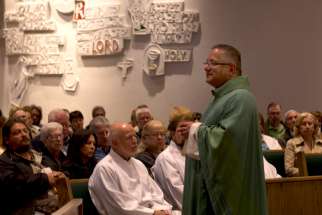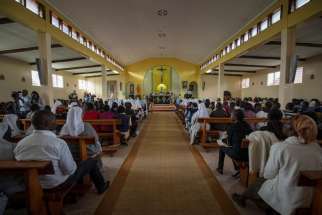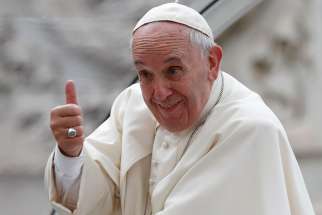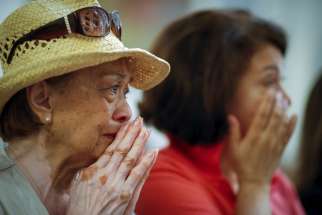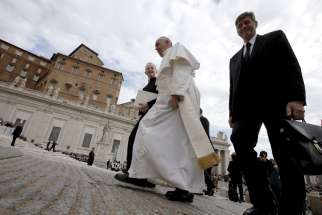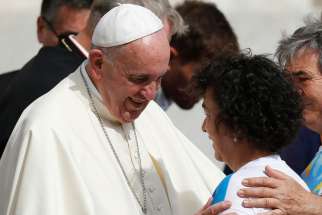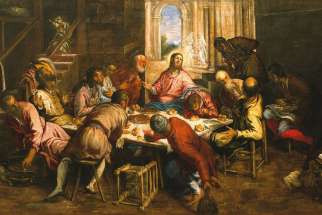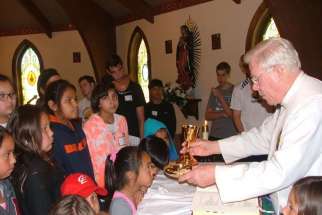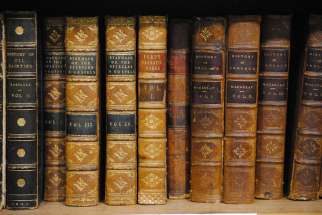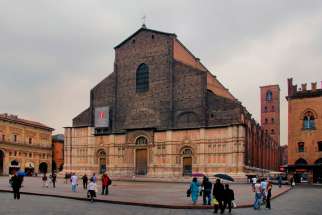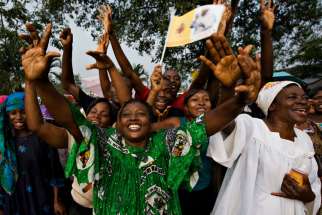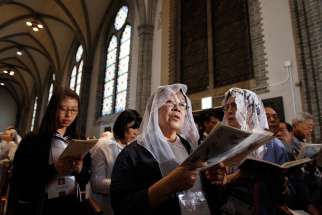The Lord’s teaching will outlast this world
33rd Sunday in Ordinary Time (Year B) Nov. 15 (Daniel 12:1-3; Psalm 16; Hebrews 10:11-14, 18; Mark 13:24-32)
Many people have been convinced that they were living through the absolute worst time in the history of the world. The carnage and destruction of the First and Second World Wars, as well as the devastation of revolutions, plagues and natural disasters all vie for the top of the list of horrors. It seemed to those who were experiencing these things that the end of the world had indeed come.
Living the Beatitudes our only hope for a just world
All Saints (Year B) Nov. 1 (Revelation 7:2-4, 9-14; Psalm 24; 1 John 3:1-5; Matthew 5:1-12a)
What are we to make of the Book of Revelation in our own time? It is not a prediction of current events or a preview of the end of the world. It was written during a time of uncertainty and persecution, most likely to give hope and encouragement to struggling and persecuted Christian communities. This particular passage is filled with rich symbols, each one of them conveying an important message about God.
Faith means trusting in God’s goodness
30th Sunday in Ordinary Time (Year B) Oct. 25 ( Jeremiah 31:7-9; Psalm 126; Hebrews 5:1-6; Mark 10:46-52)
The words of this prophecy sound far too joyful and positive to have come from Jeremiah. His prophecies were known for bitterness, lamentation, misery and predictions of doom. This prophecy, on the other hand, is alive with joy and a sense of a bright and happy future for God’s people.
It is the humble servant who is the true disciple
29th Sunday in Ordinary Time (Year B) Oct. 18 (Isaiah 53:10-11; Psalm 33; Hebrews 4:14-16; Mark 10:35-45)
Suffering is bad; it is to be feared and avoided at all costs. This is the heartfelt attitude of most people. Even though this is understandable, it is incomplete. To be sure, needless suffering should be alleviated or avoided. Masochistic self-indulgence has no place in a healthy spirituality. But there is a sort of suffering that has value, and that is suffering borne freely and willingly for the sake of others.
The value of wisdom
28th Sunday in Ordinary Time (Year B) Oct. 11 (Wisdom 7:7-11; Psalm 90; Hebrews 4:12-13; Mark 10:17-30)
You must run for your life in the face of a natural disaster. If you could take only your most precious possession, what would it be? Your car or house? Perhaps your financial portfolio or family heirlooms? The author of Wisdom had definite ideas on the matter, and his answer might be surprising to many. All the precious and valuable things in the world pale in comparison to his prize — the gift of wisdom. He heaped up superlatives singing wisdom’s praises and demonstrating how it is superior to everything else, even power, glory, gold and precious stones.
Like the innocent child, we must be open to the kingdom of the Lord
27th Sunday in Ordinary Time (Year B) Oct. 4 (Genesis 2:7ab, 15, 18-24; Psalm 128; Hebrews 2:9-11; Mark 10:2-16)
Adam means of the earth, and that is part of what we are. In this symbolic teaching story — Adam and Eve were not historical individuals — Adam was created from the ground itself. God breathed the spirit into Adam and he became a living being. A long parade of living creatures followed, and Adam named them all, implying power over them. But living beings were created for companionship and relationship, and the lack of that was soon evident. Eve was created from Adam, but that does not imply dependence or inferiority.
God’s Spirit rests upon whom it chooses
26th Sunday in Ordinary Time (Year B) Sept. 27 (Numbers 11:25-29; Psalm 19; James 5:1-6; Mark 9:38-43, 45, 47-48)
Religion is all about power — that is the judgment of many cynics and skeptics. While this is too harsh a judgment and suffers from a lack of nuance and balance, it contains an element of truth. People sense the power and energy that flows from a close relationship with God and they guard it jealously. Boundaries and rules are established, as well as ways of determining who is in or out, worthy or unworthy. Tight control is maintained over who is allowed to exercise power.
All are equal in the eyes of the Lord
25th Sunday in Ordinary Time (Year B) Sept. 20 (Wisdom 2:12, 17-20; Psalm 54; James 3:16-4:3; Mark 9:30-37)
Why was Wisdom’s holy and righteous man such an inviting target? One would think that an inspiring example of goodness and righteousness would be welcome. But truly upright individuals generate a lot of resentment, guilt and anger. Their presence can provoke a nagging sense of what we could or should be.
Faith without physical expression is not faith
24th Sunday in Ordinary Time (Year B) Sept. 13 (Isaiah 50:5-9; Psalm 116; James 2:14-18; Mark 8:27-35)
There is no shortage of individuals claiming to be agents and proclaimers of God’s will. Unfortunately, many of them represent nothing more than their own opinions, fears, prejudices and desires. Stripped of the cloak of God-talk, their words, thoughts and actions usually have little if anything to do with God. Often they divide or exclude people, stir up negative thoughts and emotions, and even end in violence that they believe is divinely sanctioned.
God has greater plans for us beyond death
Thirteenth Sunday in Ordinary Time (Year B) June 28 (Wisdom 1:13-15; 2:23-24; Psalm 30; 2 Corinthians 8:7, 9, 13-15; Mark 5:21-43)
Death is the enemy that humans fear most. People tend to blot it from their minds and often refuse to even talk about it. It is easy to bury it under a layer of euphemisms, even as aches, pains and illness become more frequent and unwelcome visitors. But in the end, death comes for us — all of us without exception.
Knowing God introduces us to infinite love
Give to God that which is His
29th Sunday in Ordinary Time (Year A) Oct. 19 (Isaiah 45:1, 4-6; Psalm 96; 1 Thessalonians 1:1-5ab; Matthew 22:15-21)
Who are the “good guys” and “bad guys” in our world? We are prone to dividing the world into the sheep and the goats and attaching the appropriate tags. It can be rather satisfying, and it doesn’t take much reflection or discernment. A mere negative visceral reaction to someone is usually sufficient grounds for a damning label.
The right path is the just path
27th Sunday in Ordinary Time (Year A) Oct. 5 (Isaiah 5:1-7; Psalm 80; Philippians 4:6-9; Matthew 21:33-43)
The prophets of Israel had an array of instruments at their disposal in their struggle to reform the nation. Symbolic behaviour — a form of street theatre — was one such technique, and it was very effective in the hands of someone like Jeremiah.
Receive the Gospel joyfully
26th Sunday in Ordinary Time (Year A) Sept. 28 (Ezekiel 18:25-28; Psalm 25; Philippians 2:1-11; Matthew 21:28-32)
No one is responsible for anything — we are all victims. If that sounds strange, that’s because it is — and yet it is one of the attitudes present in our culture. If we get in a scrape, the blame lies elsewhere — society, upbringing, personality disorders and genetics — but not with us. Even God is sometimes blamed, or accused of being unfair. God’s job is to give us a smooth, easy, and happy life and to respond to our demands.
Peace comes with submitting to God
22nd Sunday in Ordinary Time (Year A) Aug. 31 (Jeremiah 20:7-9; Psalm 63; Romans 12:1-2; Matthew 16:21-27)
We can perhaps sympathize with Jeremiah. He did not ask for the calling of a prophet — in fact, he was dragged kicking and screaming into his role as God’s mouthpiece.


